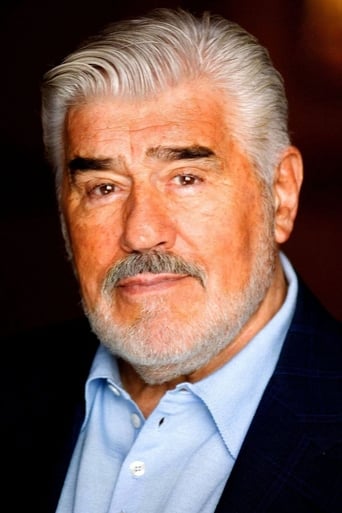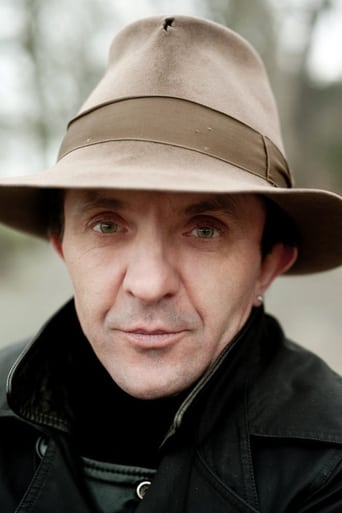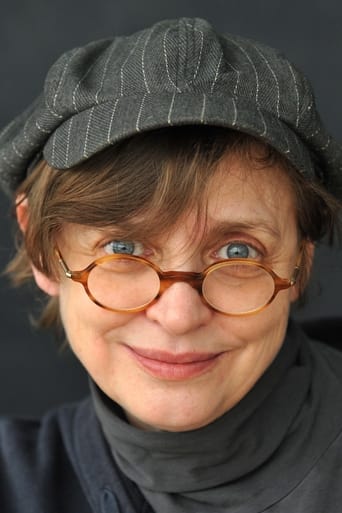Solemplex
To me, this movie is perfection.
Baseshment
I like movies that are aware of what they are selling... without [any] greater aspirations than to make people laugh and that's it.
FuzzyTagz
If the ambition is to provide two hours of instantly forgettable, popcorn-munching escapism, it succeeds.
Jonah Abbott
There's no way I can possibly love it entirely but I just think its ridiculously bad, but enjoyable at the same time.
Jackson Booth-Millard
This German film came as with many other foreign films I've seen in recent years from the book 1001 Movies You Must See Before You Die, and I have a thought process that tells me to try as many if not all films in the book, no matter what, so I did. Basically, set in Danzig, Germany the film takes place before, during and at the end of World War II, and focuses on the life of young Oskar Matzerath (David Bennent), before being born his mother wasn't sure who his father was, as she had two love interests, she married German man Alfred Matzerath (Mario Adorf), but she continued an affair with Polish cousin Jan Bronski (Daniel Olbrychski). At age 3 Oskar was given a tin drum for his birthday, he is not happy with the world around him as he grows up, so he halted his growth as a child throwing himself down the basement stairs, his tin drum becomes his comfort, but also perhaps his obsession, as he never lets it go throughout, and he found the ability that his high pitch scream can shatter glass, which he uses to stop anyone trying to take his drum away from him. Poland is invading by the German Nazis, including the small town the family live, there are two family deaths, his mother Anna Koljaiczek (Berta Drews) who kills herself swallowing large amounts of raw fish, and Jan Bronski who is killed by the Nazis while continuing to work at the Polish post office, Oskar is sheltered with his peasant cousin Maria Matzerath (Katharina Thalbach) and her father, she over a short time becomes his stepmother, but also his lover, and she ends up pregnant when they have sex. It is unclear if Oskar really is the father, but he assumes baby Kurt born is his son, but he does not stick around as he meets an old dwarf acquaintance Bebra (Fritz Hakl) who invites him to join the travelling circus of other dwarfs that perform to escape the threat the war, he entertains with his screaming talent and occasionally the tin drum, and it is there that he meets his second love Roswitha (Mariella Oliveri). This romance is cut short before the war comes to an end, and he can do nothing but go home, and returning Oskar faces the tragic loss of his father, and at the funeral he finds the strength to finally let go of his tin drum as he buries it with the coffin, and that same day his son Kurt hits him over the head with a rock, and his bodily growth is restored. Also starring Angela Winkler as Agnes Matzerath and Charles Aznavour as Sigismund Markus. In the leading part young Bennent is a fascinating character, with his piercing eyes expressing some severe emotions and never truly growing up, the film is full of surreal moments, especially any part with the tin drum and the young man's insistence to always have it and never let it go, even in dangerous situations, and of course the war element of the story is powerful in portraying struggle to survive and loss, the visuals are fantastic, and it has a lot of expressionism, it is indeed powerful and memorable wartime drama. It won the Oscar for Best Foreign Language Film. Very good!
tieman64
"The innocent are so few that two of them seldom meet. When they do meet, their victims lie strewn all round." - Elizabeth Bowen Volker Schlondorff's "The Tin Drum" stars David Bennent as Oskar Matzerath, a young boy growing up in 1920s Danzig (a city which once straddled the border between Germany and Poland). Because he's possessed an adult's (somewhat pessimistic) awareness since birth, Oskar begins to develop a deep hatred of humanity. Oskar thus decides to not advance beyond the age of three. He will not grow up in this world, and instead spends his days banging loudly on a tin drum as a show of protest.Oskar is initially painted as history's moral objector. He sees what others don't and protests what others keenly follow. Quickly, however, Oskar's drumming becomes Schlondorff's blunt metaphor for ineffectual artisans. Oskar drums and screams, but no one listens. Nazisim gathers steam, Poland is invaded, Germany's "economic miracle" occurs, and he becomes a witness to much adultery, cruelty and horror.Oskar himself becomes increasingly amoral. His body may preserve an outward innocence, but inside he grows self absorbed and cruel. And so though Oskar interrupts Nazy rallies and sympathises with the Jewish man who sold him a tin drum (and who is later killed during "Kristallnacht", the "Night of the Broken Glass", upon which the Nazis destroyed Jewish stores and synagogues), he is nevertheless quick to don a Nazi uniform and play his drum for Nazi officials.By the film's end, Oskar epitomises every man infantalized by, or made an obedient child to, the tides of history. "I prefer to be a spectator, not an artist," Oskar says. He's adopted a tone of total futility, and comes to believe that imagination, action and conviction are all inadequate in the fight against place, time and political currents. But while this is Oskar's belief – he later throws his drum away altogether – it is not something Schlondorff necessarily affirms. Oskar's drumming is shown to have the power to destabilise. In one of his more successful protests, an entire Nazi band is led into confusion by his boisterous percussion.Like the works of Wojciech Has, Schlondorff's tone here is a strange blend of surrealism, fantasy, farce, tragedy and much queasy imagery. Oskar himself has the face of a gnome, and his antics are frequently nauseating. The film also makes heavy use of symbolism, many of its major points conveyed obliquely. For example, Oskar is shown to be born in 1924, the year when Germany's economy began its post WW1 climb. On Oskar's third birthday the country's economic stability is then aligned with the child's own refusal to progress, a stagnation which echoes Germany's suspension of democratic and liberal freedoms. Oskar's drum is even shown to be threatened with a "silencing" on his sixth birthday, which occurs in 1933, the year the Nazis came into power, symbolising Nazism's quest to silence all dissenters.Other issues are raised almost imperceptibly. A throwaway line, in which one character states that he was not present for "Kristallnacht", highlights a stance which was common in Germany after the war: "it happened but I was not there; I did not participate". Meanwhile, Oskar's own uncle is quick to replace a picture of Beethoven with Hitler when the Nazi Party comes into power, and replaces it just as quickly when the Nazi's are defeated. He is the "everyday" Nazi, his allegiances blowing with the winds of change.One of the most disturbing passages in the film revolves around fishermen plucking eels from a dead horse's head, a sequence which mirrors the eating habits of other characters in the film, all of whom are shown to be always munching on seafood. This food is later aligned to the corpses of English sailors sunk in naval battles off the coast of Germany. While Oskar protests, Germany eats her foes (while the country rots from the head down?).Anti-semitism is touched upon openly – Jewish shop-keepers are bullied and driven to suicide – but briefly. More interesting are several sequences in which Oskar damns the Catholic Church for not resisting Hitler (see Costa Gavras' "Amen"). In one of the film's more overt moments, Oskar slaps a statue of Christ and accuses him of not helping. Meanwhile, religion is mirrored to Germany's frenzied, quasi religious adulation for Hitler, whom Oskar calls "the Gas Man", a warped version of Father Christmas. Mirrored to these two national fathers (Christ and Hitler) are Oskar's own two fathers (a Polish and German father), both of whom are condemned to death by Oskar's behaviour. Schlondorff would revisit similar material with his 2004 film, "The Ninth Day".8/10 – See "The Garden of the Finzi Continis", "The Damned", "Seven Beauties", "Special Section" and "Protector".
lastliberal
Do you dismiss a movie because it is strange? Some do, and rate this film as a story about an obnoxious little boy who goes around banging a drum and breaking glass.Firstly, the performance of David Bennent as Oskar was phenomenal. As an 11 or 12 year old, he played a part from infancy to 21. Maybe he was obnoxious, but I choose to believe that he was making a powerful statement about the undesirability of growing up in a world where adults do not act very adult.Set against the backdrop of WWII, it can also be viewed as rebellion against war and fascism.Strange, sometimes evil, but nevertheless a powerful film that should be seen by all.
Robert J. Maxwell
There's never a dull moment in this allegorical film about growing up -- or deciding NOT to grow up -- in a German/Polish village between the first and second World Wars. Everyday life is coarse. The cobblestone streets are crowded with horse-drawn buggies and vendors. Everyone seems to shout or to talk emphatically. There are pompous political festivals and fustian speeches that end in rainstorms. Enthusiastic bands march clumsily around, hitting innumerable clinkers. People sit at tables and eat unappetizing meals, not decorously, but more like animals -- not "essen" but "fressen." Sometimes they stuff themselves with fish until they die. There are grotesqueries: circuses, dwarfs, clowns, superhumanly tall psychotics. If we didn't know it was a German movie directed by Volker Schlondorff, we might mistake it for Fellini.But it's from Gunther Grass's novel about a little boy who sees the political climate changing around him and decides to stop growing at the age of three. We follow him until he's twenty, through strife, love affairs, grief, disgust.The background for all this is the development of Naziism in Germany, which the little boy, Oscar, refuses to participate in. What a case of arrested development although, like Forrest Gump, he has one outstanding ability that makes him different from others, and that's a high piercing scream that shatters glass.It's a strange film, ambiguous and full of symbols, some of which got by me. I didn't get Oscar's attachment to his tin drum, for instance, unless it stands for Oscar's neoteny, which, itself, stands for Oscar's unwillingness to grow along with Fascism. In that case, though, the drum would be a higher-order symbol, a symbol of a symbol, or a metasymbol. Where was I? Stanley Kubrick and Adrian Lyne both had a hell of a time getting their versions of "Lolita" made and released. (Child pornography, about which you wouldn't know, Lo.) But here Oscar runs around bare naked, falls in love with and marries a midget, and has intercourse with a teenaged girl whom he impregnates. But the blue noses are not up in arms about it. Those who made "Lolita" a nightmare to release have said nothing about it. Oh, Lo, how the mighty have ignored it.I haven't read the novel but I admire the movie for a couple of reasons, not just because of its recognition that Naziism was an aberration, but because everyone is given his or her due. The evil is there, and it's explored, but not exemplified in stereotypes. Oscar's step father, for instance, is swept up in the movement and wears his khaki uniform proudly, but he's more stupid than cruel -- brusque and thoughtless without being unkind. And Sigismund Markus (Charles Aznavour), the dreamy Jewish dry goods dealer who is in love with Oscar's mother. When he learns she's having an affair with a Polish citizen, he ironically advises her, "Don't bet on the Poles. Bet on the Germans. Or, better yet, bet on me." And if Oscar is the hero, sometimes the hero acts like a spoiled little brat. The film is narrated by Oscar in his little boy's voice and adds a good deal to our grasp of his feelings and of the backdrop against which this drama is played. It's not dull exposition. "I went here, then I lost track of my beloved, then I looked for another drum." Instead: "Once there was a gullible people who were told that Santa Claus was coming, but Santa Claus turned out to be the GAS man." (Cut to a scene of soldiers clearing a building with a flame thrower.) The narration is read most expressively.The movie begins with Oscar's grandmother back around the turn of the century, sitting on a heap of damp earth in a bleak farmland, scorching some potatoes in a small fire. At the end, when Oscar and the others leave, she remains behind. The final shot is of a train drawing away in the distance while an old lady sits before a smoky fire on a heap of dirt. I think I managed to catch that particular symbol. She's Anna Livia Plurabelle, right? A remarkable film.







